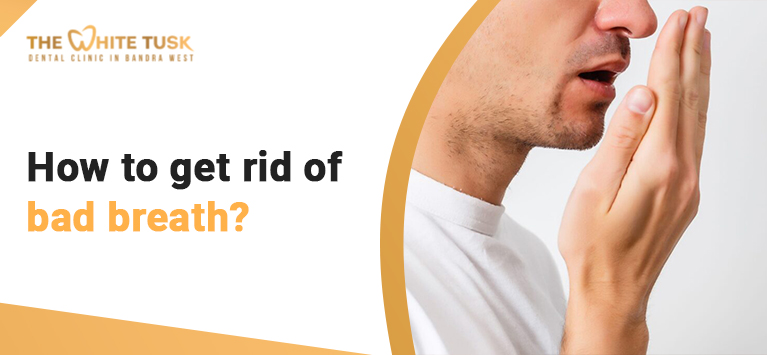
Bad breath, or halitosis, is a common problem that affects many people. Various factors, such as poor oral hygiene, certain foods, smoking, dry mouth, gum disease, and medical conditions, can cause it. Fortunately, there are practical steps that can be taken to address and overcome this concern effectively. By adopting a consistent oral care routine and making lifestyle adjustments, it’s possible to prevent and treat bad breath. In this blog, we will explore the 5 best ways to get rid of bad breath.
Brushing your teeth at least twice a day, using fluoride toothpaste and a soft-bristled toothbrush, is the first step to maintaining good oral hygiene. Brushing removes plaque, food particles, and bacteria that can cause bad breath. Pay attention to the back of your tongue, where most of the odour-causing bacteria reside. You can use a tongue scraper or a toothbrush to clean your tongue gently.
Flossing your teeth at least once a day, preferably before bedtime, is another important habit to prevent bad breath. Flossing removes the plaque and food particles that get stuck between your teeth and gums, where your toothbrush cannot reach. Flossing also helps prevent gum disease, which is a significant cause of bad breath.
Rinsing your mouth with water or mouthwash after eating or drinking can help wash away any food particles or bacteria that may linger in your mouth. Rinsing also helps keep your mouth moist, which prevents dry mouth, another cause of bad breath.
Some mouthwashes contain antibacterial or antiseptic ingredients that can kill the bacteria that cause bad breath. However, some mouthwashes may also contain alcohol, which can dry out your mouth and worsen bad breath. Therefore, it is advisable to choose a mouthwash that is alcohol-free and has a seal of approval from a reputable dental association.
Some foods and drinks can cause bad breath by leaving a strong odour in your mouth or by affecting the balance of bacteria in your mouth. Some of the common culprits are garlic, onion, cheese, coffee, alcohol, and tobacco.
If you consume these foods or drinks, make sure to brush your teeth, floss, and rinse your mouth afterwards. You can also chew sugar-free gum or mint to mask the odour temporarily. However, the best way to avoid bad breath from these sources is to limit or avoid them altogether.
Drinking enough water throughout the day is essential for your overall health and well-being. It is also beneficial for your oral health and breathing. Water helps flush out the bacteria and food particles that can cause bad breath. It also helps stimulate saliva production, which is your mouth’s natural defence against bad breath. Saliva helps neutralise the acids and enzymes that can damage your teeth and gums and also contains antibacterial and antifungal properties that can fight bad breath.
According to the study, the recommended amount of water intake per day for adults is about 15.5 cups (3.7 litres) for men and 11.5 cups (2.7 litres) for women. However, this may vary depending on your age, activity level, climate, and health conditions.
Last but not least, visiting your dentist at least twice a year for checkups and cleaning is crucial for preventing and treating bad breath. Your dentist can examine your teeth, gums, and tongue for any signs of decay, infection, or disease that may cause bad breath. Your dentist can also remove any plaque or tartar that has built up on your teeth and gums, which can harbour bacteria and cause bad breath.
Your dentist can also advise you on the best oral hygiene practices and products for your specific needs. Suppose an underlying medical condition, such as diabetes, kidney disease, or sinus infection, causes your bad breath. In that case, your dentist can refer you to a doctor for proper diagnosis and treatment.
Bad breath is a common issue that can be managed effectively with the right approach. Incorporate these practical tips and remedies to help you find a cure for bad breath. Remember, consistency is key to maintaining fresh breath and a healthy mouth. For personalised advice and further information, consult a dental professional to address your specific concerns about bad breath. With the right approach and guidance, you can find a cure for bad breath and enjoy a fresh and confident smile.